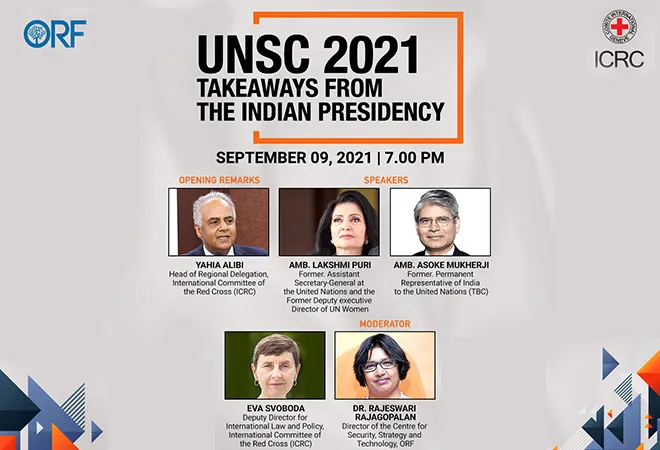In August 2021, India undertook its tenth tenure as President of the United Nations Security Council (UNSC), after a gap of ten years. As its month-long presidency came to a close, the International Committee of the Red Cross (ICRC) and ORF hosted a discussion to look at the major takeaways from the presidency and how India played a key role at the world’s stage.
Mr Yahia Alibi in his welcome remarks highlighted that “India has been playing a leading role in building consensus at the global level on global policies”. He went on to suggest that it was important to build consensus for engagement. For him, a key area of engagement is the role of humanitarian action in conflict zones.
Amb Lakshmi Puri began by sharing that what set India’s presidency apart was PM Modi vowing to ensure that the voice of the unrepresented are heard and are in the forefront while creating a new orientation to multilateralism, and his chairing of a session which was a first for an Indian Prime Minister to do so, along with several other Heads of States and senior ministers at the session. She then went on to speak about the challenge the Afghan crisis posed, testing India's diplomacy, power, and strength in a space where the UN itself was being criticised. For her, India navigated this test by not only focusing on safeguarding and advancing issues of its vital interests, but also issues of counterterrorism, peace, and security.
Amb Asoke Mukherji focused on India’s stint as the President of the United Nation Security Council (UNSC) through four priorities. The first, reformed multilateralism – and in its root the reform of the UNSC itself. The second is to make counterterrorism more effective by including actors outside of the security council. The third priority is more effective peacekeeping—by modernisation and greater inclusion of United Nations Peace Keeping Force (UNPKF). The final priority was to make the UNSC’s decision-making more human-centric, through electoral accountability.
Ms Eva Svaboda focused on counterterrorism and brought forth the perspective of organisations like the ICRC. States and international organisations have developed robust measures to enhance their counterterrorism frameworks by either tightening existing methods or introducing new ones. Unfortunately, some of these measures have often worked against humanitarian action and made access for impartial humanitarian organisations more difficult. This has happened in four ways. First, counterterrorism penal laws that work towards limiting monetary and other support for terrorist organisations. often include organisations that work towards humanitarian efforts under its mandate due to the vague definition and implementation. The second is sanctions by regimes, the third is donor requirements, and the fourth, over compliance or de-risking activities.
Counterterrorism continued to be a key focus of the conversation. Amb Puri questioned the absence of a convention on counterterrorism and terrorism which would serve as a legally binding treaty to bring together states and also help to create uniform standards that could help alleviate some of the issues that humanitarian organisations face. Amb Mukherji went a step ahead to highlight that such a convention is in its preparatory stages and that there would need to be a sense of political will, especially among Islamic countries to agree to it. He also argued that there is a de facto understanding among states on definition, but the differences lie in enforcement. Ms Svaboda asserted that an SC resolution is only effective when translated into domestic law—and that there needs to be better cross-department conversation and coordination, and guidance to create better domestic enforcement.
Dr Rajagopalan concluded by summarising India presidency at the UNSC as a balance between engaging with old challenges, like counterterrorism, and some of the new challenges, like maritime security.
The views expressed above belong to the author(s). ORF research and analyses now available on Telegram! Click here to access our curated content — blogs, longforms and interviews.
